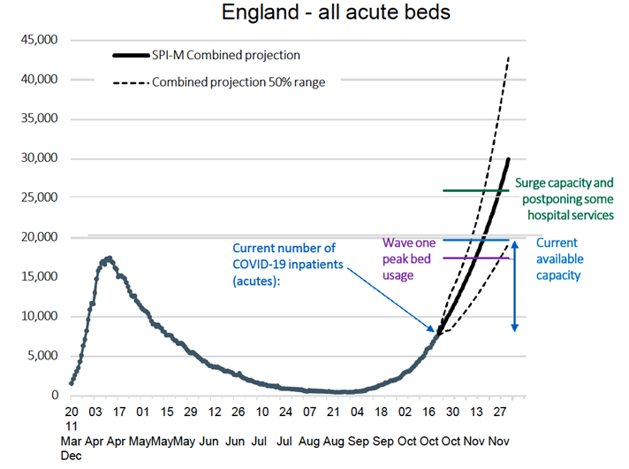New National Restrictions and the Impact on Restart
The announcement on the weekend of a further national lockdown highlighted the significant pressures mounting on the health system and the impact of the growing number of cases translating into increased hospitalisation.
Doctors’ leaders have, however, warned that hospitals will be forced to cancel routine operations across England due to pressures from resurgent Covid cases, despite these new lockdown measures. They have indicated that the situation will deteriorate in the short-term due to 100,000 vacancies impacting on ability to utilise Nightingale capacity, and the time lag from infection to hospitalisation for the lockdown to impact on transmission rates.
Hospitals will find it hard to treat both Covid patients and those with other illnesses unless the public strictly follow the new rules from Thursday, warned the Faculty of Intensive Care Medicine. “Intensive care units have seen a steady increase in the number of Covid cases. Staff are back in full PPE, working in surge capacity, non-ICU staff are helping out. Routine operations are being cancelled in order to accommodate Covid patients. It all feels like ‘déjà vu’ but with the added burden of trying to maintain as much non-Covid activity as possible.”
It is this trend that spurred the latest lockdown with projections (also see below graph) showing that capacity could be overrun. Daily hospital Covid admissions are now higher than on 23 March when the first national lockdown was announced and NHS doctors and nurses in many areas of England – including Liverpool, Lancashire and Nottinghamshire – are now treating more Covid patients than at the peak of the first wave.

NHS England and Boris Johnson want normal NHS care, especially surgery, to continue during the second wave. But the Society for Acute Medicine view that as unlikely and that the needs of people needing life or death care because of Covid must take priority.
As such we are already seeing postponements of non-urgent interventions in some Trusts from the hardest hit regions. There is however a difference in approach with cancellations and postponement being implemented on a short-term basis to relieve pressure, rather than the blanket cessation of services we saw previously.
As I covered in my latest update for Members, despite the stated position of NHS England and Government for normal NHS care to continue, it is difficult not to conclude that the number of procedures will be impacted. We are therefore continuing to engage with Ministers and the NHS on this critical issue and are working with NHS England, both nationally and via the regional teams, to relay our key messages.




